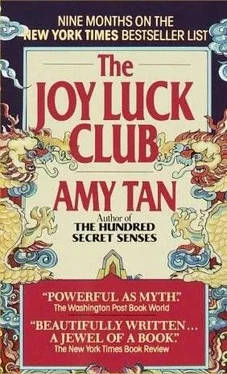I looked out the window and saw the calla lilies had fallen and turned brown, the daisies had been crushed down by their own weight, the lettuce gone to seed. Runner weeds were growing between the flagstone walkways that wound between the planter boxes. The whole thing had grown wild from months of neglect.
And seeing the garden in this forgotten condition reminded me of something I once read in a fortune cookie: When a husband stops paying attention to the garden, he's thinking of pulling up roots. When was the last time Ted pruned the rosemary back? When was the last time he squirted Snail B-Gone around the flower beds?
I quickly walked down to the garden shed, looking for pesticides and weed killer, as if the amount left in the bottle, the expiration date, anything would give me some idea of what was happening in my life. And then I put the bottle down. I had the sense someone was watching me and laughing.
I went back in the house, this time to call a lawyer. But as I started to dial, I became confused. I put the receiver down. What could I say? What did I want from divorce-when I never knew what I had wanted from marriage?
The next morning, I was still thinking about my marriage: fifteen years of living in Ted's shadow. I lay in bed, my eyes squeezed shut, unable to make the simplest decisions.
I stayed in bed for three days, getting up only to go to the bathroom or to heat up another can of chicken noodle soup. But mostly I slept. I took the sleeping pills Ted had left behind in the medicine cabinet. And for the first time I can recall, I had no dreams. All I could remember was falling smoothly into a dark space with no feeling of dimension or direction. I was the only person in this blackness. And every time I woke up, I took another pill and went back to this place.
But on the fourth day, I had a nightmare. In the dark, I couldn't see Old Mr. Chou, but he said he would find me, and when he did, he would squish me into the ground. He was sounding a bell, and the louder the bell rang the closer he was to finding me. I held my breath to keep from screaming, but the bell got louder and louder until I burst awake.
It was the phone. It must have rung for an hour nonstop. I picked it up.
"Now that you are up, I am bringing you leftover dishes," said my mother. She sounded as if she could see me now. But the room was dark, the curtains closed tight.
"Ma, I can't…" I said. "I can't see you now. I'm busy."
"Too busy for mother?"
"I have an appointment…with my psychiatrist."
She was quiet for a while. "Why do you not speak up for yourself?" she finally said in her pained voice. "Why can you not talk to your husband?"
"Ma," I said, feeling drained. "Please. Don't tell me to save my marriage anymore. It's hard enough as it is."
"I am not telling you to save your marriage," she protested. "I only say you should speak up."
When I hung up, the phone rang again. It was my psychiatrist's receptionist. I had missed my appointment that morning, as well as two days ago. Did I want to reschedule? I said I would look at my schedule and call back.
And five minutes later the phone rang again.
"Where've you been?" It was Ted.
I began to shake. "Out," I said.
"I've been trying to reach you for the last three days. I even called the phone company to check the line."
And I knew he had done that, not out of any concern for me, but because when he wants something, he gets impatient and irrational about people who make him wait.
"You know it's been two weeks," he said with obvious irritation.
"Two weeks?"
"You haven't cashed the check or returned the papers. I wanted to be nice about this, Rose. I can get someone to officially serve the papers, you know."
"You can?"
And then without missing a beat, he proceeded to say what he really wanted, which was more despicable than all the terrible things I had imagined.
He wanted the papers returned, signed. He wanted the house. He wanted the whole thing to be over as soon as possible. Because he wanted to get married again, to someone else.
Before I could stop myself, I gasped. "You mean you were doing monkey business with someone else?" I was so humiliated I almost started to cry.
And then for the first time in months, after being in limbo all that time, everything stopped. All the questions: gone. There were no choices. I had an empty feeling-and I felt free, wild. From high inside my head I could hear someone laughing.
"What's so funny?" said Ted angrily.
"Sorry," I said. "It's just that…" and I was trying hard to stifle my giggles, but one of them escaped through my nose with a snort, which made me laugh more. And then Ted's silence made me laugh even harder.
I was still gasping when I tried to begin again in a more even voice: "Listen, Ted, sorry…I think the best thing is for you to come over after work." I didn't know why I said that, but I felt right saying it.
"There's nothing to talk about, Rose."
"I know," I said in a voice so calm it surprised even me. "I just want to show you something. And don't worry, you'll get your papers. Believe me."
I had no plan. I didn't know what I would say to him later. I knew only that I wanted Ted to see me one more time before the divorce.
What I ended up showing him was the garden. By the time he arrived, the late-afternoon summer fog had already blown in. I had the divorce papers in the pocket of my windbreaker. Ted was shivering in his sports jacket as he surveyed the damage to the garden.
"What a mess," I heard him mutter to himself, trying to shake his pant leg loose of a blackberry vine that had meandered onto the walkway. And I knew he was calculating how long it would take to get the place back into order.
"I like it this way," I said, patting the tops of overgrown carrots, their orange heads pushing through the earth as if about to be born. And then I saw the weeds: Some had sprouted in and out of the cracks in the patio. Others had anchored on the side of the house. And even more had found refuge under loose shingles and were on their way to climbing up to the roof. No way to pull them out once they've buried themselves in the masonry; you'd end up pulling the whole building down.
Ted was picking up plums from the ground and tossing them over the fence into the neighbor's yard. "Where are the papers?" he finally said.
I handed them to him and he stuffed them in the inside pocket of his jacket. He faced me and I saw his eyes, the look I had once mistaken for kindness and protection. "You don't have to move out right away," he said. "I know you'll want at least a month to find a place."
"I've already found a place," I said quickly, because right then I knew where I was going to live. His eyebrows raised in surprise and he smiled-for the briefest moment-until I said, "Here."
"What's that?" he said sharply. His eyebrows were still up, but now there was no smile.
"I said I'm staying here," I announced again.
"Who says?" He folded his arms across his chest, squinted his eyes, examining my face as if he knew it would crack at any moment. That expression of his used to terrify me into stammers.
Now I felt nothing, no fear, no anger. "I say I'm staying, and my lawyer will too, once we serve you the papers," I said.
Ted pulled out the divorce papers and stared at them. His x's were still there, the blanks were still blank. "What do you think you're doing? Exactly what?" he said.
And the answer, the one that was important above everything else, ran through my body and fell from my lips: "You can't just pull me out of your life and throw me away."
I saw what I wanted: his eyes, confused, then scared. He was hulihudu . The power of my words was that strong.
That night I dreamt I was wandering through the garden. The trees and bushes were covered with mist. And then I spotted Old Mr. Chou and my mother off in the distance, their busy movements swirling the fog around them. They were bending over one of the planter boxes.
Читать дальше












